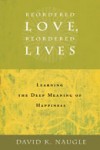David Naugle is professor of philosophy at Dallas Baptist University and the author, most recently, of Reordered Love, Reordered Lives: Learning the Deep Meaning of Happiness. I had a chance to meet David at Jubilee 2010 and ask him a few questions about the nature of happiness, his life as a faculty member, and advice for students considering academic vocations. Originally posted on the ESN website. Mike Hickerson: I don't want to give too much away from the book, but what would be your capsule definition of … [Read more...] about Interview: David Naugle on Love, Happiness, and Paideia
